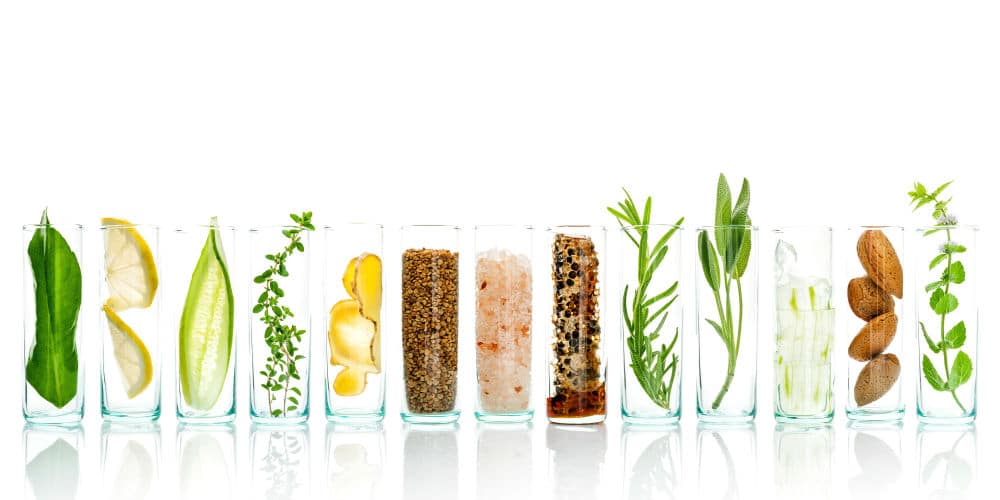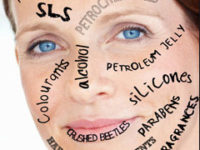The cosmetics, shampoos, lotions and other products we put on our bodies can be just as harmful as anything we put in them. Ingredients found in face washes, sunscreens and more have been linked to everything from hormonal disruptions to cancer, and what’s worse is that they go directly into your bloodstream when applied to the skin or hair. While there are certainly lots of studies with different perspectives on this topic, everyone can agree that using more natural products or—better yet, making your own—is the safest bet for you and the environment.
Most people use around 10 personal care products every day, with an average of 126 different ingredients.
Since the federal cosmetics law was written more than 70 years ago, the FDA has banned just eight out of the 12,000-plus ingredients used in cosmetics compared to 11,000 banned so far in the E.U. What the FDA does regulate is the accuracy of the labeling on cosmetics.
So it's up to us to determine which ingredients are harmful, not the other way around. Choosing products with fewer ingredients is a terrific start. Steer clear of products containing a long list of hard-to-pronounce chemicals...just like how you shop for food! You wouldn't want it in your body so why let it absorb through your skin?
So, what ingredients should signal a red flag for you?
1,4 Dioxane: Found in an alarming number of baby products, this chemical is a byproduct of the process ethoxylation (increases water solubility). Can also be listed as PEG or ingredients ending in "eth" or "oxynol". The EPA classifies it as a probable carcinogen to humans. It is readily absorbed through the skin and also found in hair products, lotions, face creams and anti-aging products.
Parabens: Listed as methyl, propyl, butyl and ethyl paraben and found in 75-90% of all products on the market. This preservative displays estrogenic activity in several tests. It is a known medical fact that estrogen stimulates breast cancer and anything absorbed through the skin may be as high as 10 times the concentration of an oral dose. What products contain parabens? Found in many many products from lotions, scrubs, conditioners, shampoos and make-up.
Formaldehyde: Recently added to the known carcinogens list. It’s most commonly used as a water solution called formalin, rather than in its pure form. With the help of preservatives, formaldehyde is released in small amounts over time to help protect cosmetic products against contamination by bacteria during storage and during continued use. Also referred to as Quanternium-15 or DMDM hydantoin. Where is formaldehyde found? Used in nail polishes, nail hardeners, eyelash glues, hair gels, soaps, makeup, shampoo, lotions and deodorants and hair straightening treatments.
Phthalates/Fragrance: DHP, DBP5, DEHP, and dibutyl phthalate are used in personal care products. They are considered probable carcinogens by the EPA and likely to cause cancer. Phthalates are also known endocrine disruptors (may interfere, mimic or block hormones), development toxicants (can interfere with the normal development of a fetus or child), and a reproductive toxicant (can harm the reproductive system). Phthalates can be inhaled and also absorbed through the skin via perfume, nail polish, skin lotion, deodorant and some hair styling products. Since the ingredients are not required on fragrances, there is no way to know if phthalates are in a fragrance. A safer alternative is to choose pure essential oils instead of perfumes.
Coal Tar Dyes: A known carcinogen and made from bituminous coal. Found in dandruff and psoriasis shampoos, anti-itch creams, hair dyes and other cosmetics. Also listed as p-phenylenediamine and colors listed as "CI", "FD&C," or "D&C."
Sodium Laureth Sulfate (SLES), Sodium Lauryl Sulfate (SLS): Surfactants used in shampoos for its detergent and foam-building abilities. They are commonly used because they are effective at cutting through grease and are inexpensive. Easily absorbed into body tissues and strongest concern is the potential contamination with 1,4 dioxane. Can cause eye irritations, skin rashes, hair loss, scalp scurf similar to dandruff, and allergic reactions.
Petrolatum: A derivative of petroleum/crude oil--this chemical is an endocrine disruptor and a carcinogen. Healthy skin needs to take in oxygen and release carbon dioxide. Instead, this chemical may suffocate the skin. Found in lotions, hair products, lip balms and lip sticks.
Triclosan: A synthetic antimicrobial agent. Also has antibacterial, antifungal and antiviral properties. Endocrine and thyroid disrupter and bioaccumulates in the body. Found in many cosmetic products including anti-bacterial soap, shampoo, facial cleanser, toothpaste and deodorant.
Polyethylene Glycol (PEG): Used as a moisture sealer and as a penetration enhancer. Often listed as PEG on an ingredients list but also PG (Propylene Glycol). Easily absorbed through the skin and at greatest risk when contaminated (includes 1,4 dioxane, lead, nickel and arsenic). Found in many products including shampoo, baby washes, lotions, soaps and make-up.
TEA (triethanolamine), DEA (Diethanolamine) and MEA (Monoethanolamine): these are hormone-disrupting chemicals known to form nitrates and nitrosamines. Often used in cosmetics as emulsifiers and/or foaming agents, adjust the pH, and used with many fatty acids to convert acid to salt (stearate), which then becomes the base for a cleanser. TEA causes allergic reactions including eye problems, dryness of hair and skin, and could be toxic if absorbed into the body over a long period of time. Where are they found? In most products--lotions, shampoos, conditioners, shaving gels, bubble bath, creams. Nitrosamines are found in mascara and concealer and are banned in Canada and the EU.
We know it can be difficult to let go of skincare or cosmetics that you've used for years. At Botanical Green Care we challenge ourselves to find the safest alternatives for you and your family, products that we believe are healthy AND more effective.







